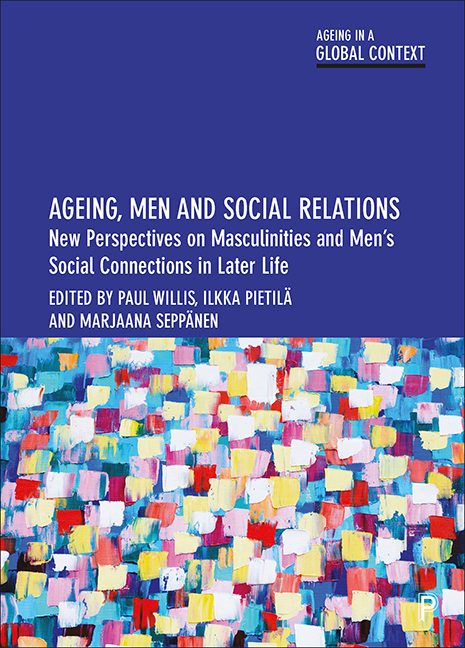 Ageing, Men and Social Relations
Ageing, Men and Social Relations Book contents
6 - Mobility and the impact of the physical and built environment on older men’s social connections
Published online by Cambridge University Press: 18 January 2024
Summary
Introduction
Mobility and access to physical space in the built environment is gendered. People’s behaviour in public space is affected by such elements as their feelings of safety and their perceived legitimacy to be there, and how far they desire to be in such space, and this all depends in some respects upon their gender. This chapter examines different types of interaction in the built environment, including how we access space through mobility and transport and where this might differentiate in terms of gender. This chapter then explores research with older people in semi-structured interviews that discussed their interactions with public spaces, including what resources they drew on when travelling to and from the space, and highlights gender differences with a focus on issues older men face in public spaces, framed around a theory of mobility capital (Musselwhite and Scott, 2019).
Importance of mobility in later life
Older people in many high-income countries are more mobile than previous generations. People desire to stay connected to family and friends across the world, and often are still working and enjoying more leisure-based activity. As would be expected, mobility is important to older people’s health and wellbeing (Schlag et al, 1996). However, older people more than any other group mention more barriers to mobility and are more likely to mention mobility as a barrier to fulfilling their needs and desires (see Musselwhite and Scott, 2021). A lack of mobility is linked to poorer health and wellbeing and increases in depression and loneliness (Ling and Mannion, 1995; Fonda et al, 2001). Older people in high-income countries tend to be frequent car users and giving up driving can be associated with poor health outcomes due to a lack of being able to fulfil daily routines, but also psychosocial or affective reasons (Musselwhite and Haddad, 2010; 2018). Alternatives to the car can be difficult to use for a variety of physiological but also social or affective reasons (Musselwhite, 2018). These mobility spaces that give people access to what they want to do and who they want to see can be gendered, as discussed in the next section.
- Type
- Chapter
- Information
- Ageing, Men and Social RelationsNew Perspectives on Masculinities and Men's Social Connections in Later Life, pp. 88 - 104Publisher: Bristol University PressPrint publication year: 2023


